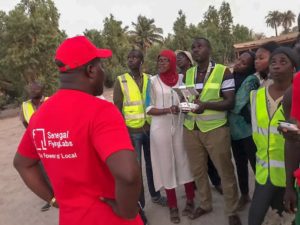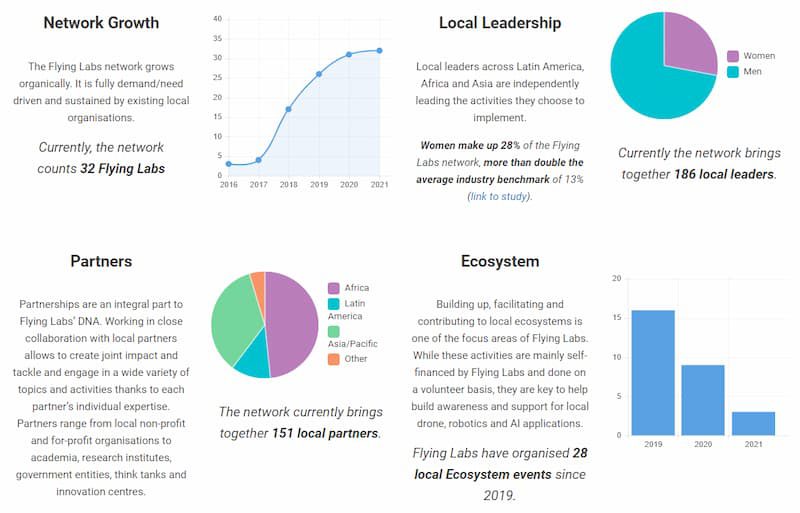
New! Introducing the Flying Labs Impact Page
In this rapidly growing network, having an effective monitoring and evaluation system allows us to grow from our experiences and demonstrate our impact.
July 1st, 2021
"Who are we, if not measured by our impact on others? That’s who we are! We are not who we say we are, we are not who we want to be - we are the sum of the influence and the impact we have, in our lives, on others." ~ Carl Sagan
At the core of our mission lies the Power of Local, shifting power back to the local experts who leverage new technologies to tackle their local challenges. And we do this by co-creating Flying Labs—a fast-growing network of local experts and partner organizations—to enable more inclusive, locally-led, sustainable, and impactful social good projects in Africa, Asia, Latin America & beyond. Flying Labs are independent and locally-led knowledge hubs that create local impact by strengthening local capacity, running and enabling locally-led social good projects, and facilitating local ecosystems for drones, robotics, and related data and AI solutions. In addition, they offer a range of services across multiple sectors, which you can see listed here.

As the network of Flying Labs grows, so do their members, partners, activities, projects, and resources that we generate to share our experiences and the lessons learned. In this rapidly growing network, having an effective monitoring and evaluation system that allows us to learn from our experiences to move forward and demonstrate our work's impact is vital.
Having this in mind, since 2018, we have set on a journey to capture the essence of our work through the most relevant indicators and collect the necessary data from the Flying Labs. In 2018, a team from the Columbia University's School of International and Public Affairs (SIPA) collaborated with us to create a broad set of impact indicators. Since then, our indicators have evolved and continue to grow and adapt based on our constant learnings with Flying Labs. In addition to recently updating our WeRobotics impact page, we also launched a separate impact page for Flying Labs on behalf of the Flying Council.
"This has been an exciting yet challenging journey with many trials and errors," said Uyangaa Munkhbat, Flying Labs community coordinator. Given the different structures of Flying Labs and the diversity of our activities, capturing the essence of our work through the most relevant indicators and finding the most suitable method for data collection was and is still the most challenging part. As with everything else, Flying Labs members are an integral part of this process, and we continue to try and test different indicators and methods with them.
As you'll note from the Flying Labs impact page, women make up 28 percent of the network, which is more than double the industry benchmark of 13 percent. You'll also note that the network has grown from 4 Flying Labs in 2018 to over 30 in 2021. The impact page also provides data on social good projects and training led by Flying Labs and the SDGs they target; the opportunities and values transferred from WeRobotics to Flying Labs, the number of local professionals trained and youth engaged, and the resources and tools created. The impact page is updated three times per year in collaboration with each Flying Labs.
As for our method to collect the data, we started with getting Google forms filled out, producing mini-newsletters, and keeping a centralized list of Projects and Training. Today, our method is simple but effective. First, we create use cases and keep up to date individual lists of Flying Labs activities. Then, we collect these data through regular one-on-one calls with each Flying Labs, allowing us to learn and improve our process as we go.
We still have a long way to go, and it's a continuous learning journey for us. As we learn, we grow stronger and go further together.
We invite you to discover the impact Flying Labs create in and with their local communities by visiting the impact page on the Flying Labs website.
Category(s)
Location(s)
Recent Articles
View All »

Fixed-Wing, Rotary-Wing, and VTOL Drone Training with Japan Flying Labs

